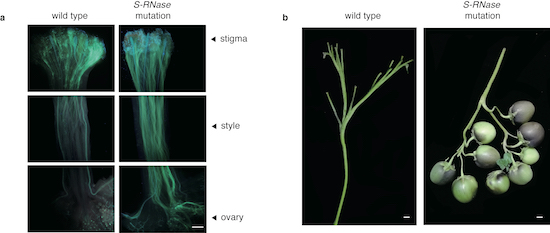Generation of Self-compatible Diploid Potato by Genome Editing
Researchers at Agricultural Genomes Institute at Shenzhen (AGIS) of Chinese Academy of Agricultural Sciences (CAAS) have published a brief communication on Journal of Nature Plants about overcoming the self-incompatibility of diploid potato by genome editing. This is the first published research article since the implementation of the “Upotato Plan”.
Potato is the most important tuber crop in the world. For a long time, the research and production of potato have been dominated by tetraploid, which has caused the potato industry to face two structural obstacles. Firstly, the inheritance of tetraploid is very complicated, resulting in long breeding cycle and slower variety renewal; secondly, the potato is propagated by tubers, which has defects such as low reproductive coefficient, high storage and transportation cost, and easily carrying of pests and diseases. In order to completely break these two obstacles, with the supports of the Ministry of Agriculture and Rural Affairs, Prof. Huang Sanwen collaborated with the domestic and foreign organizations, and launched the “Upotato Project”, which used genomics and synthetic biology to guide the “green revolution” of the potato industry, expecting to achieve the goals of replacing the tetraploid with diploid and replacing the vegetative reproduction with hybrid seeds. A subversive innovation in the breeding and reproduction of potato will come. The project was listed by the CAAS as one of the “Major Output Scientific Research Topics”.

About 70% potato germplasms are diploid in the nature, the rich genetic variations from which provides basis for the implementation of “Upotato Plan”. However, diploid potato generally suffers self-incompatibility problem that limits the creation of inbred lines. To realize the "Upotato plan", the problem of self-incompatibility must be solved. The traditional way to overcome self-incompatibility is to use the S-locus inhibitor (Sli) from wild potato, but introgression of the Sli gene will result in some undesirable traits, such as long stolons, small tubers, high solanine content, and etc. To find a more effective way to overcome self-incompatibility, Huang’s lab innovatively used genome editing to resolve this problem. The potato self-incompatibility is controlled by the ribonuclease gene (S-RNase), which is highly polymorphic in different accessions, and it is difficult to clone the entire S-RNase gene by homologous cloning. However, they obtained the full-length sequences of the S-RNase alleles by de novo assembly of the style transcriptome, and then generated self-compatible diploid potato by knocking out the S-RNase using CRISPR/Cas9 system. The exogenous Cas9-cassette was removed by selfing. These Cas9-free diploid clones can be directly applied to the breeding process to provide a guarantee for the smooth implementation of the “Upotato Plan”.
This study was funded by the Ministry of Agriculture and Rural Affairs, the Science and Technology Innovation Project of the Chinese Academy of Agricultural Sciences and the High-level Talent Project in Yunnan Province (Grant No.: CAAS-ZDXT2018004). More details are available on the bellow links: https://www.nature.com/articles/s41477-018-0218-6
By Peng Zhen
pengzhen_yy@aliyun.com
-
 Apr 18, 2024Opening Ceremony of the Training Workshop on Wheat Head Scab Resistance Breeding and Pest Control in Africa Held in CAAS
Apr 18, 2024Opening Ceremony of the Training Workshop on Wheat Head Scab Resistance Breeding and Pest Control in Africa Held in CAAS -
 Apr 03, 2024IPPCAAS Co-organized the Training Workshop on Management and Application of Biopesticides in Nepal
Apr 03, 2024IPPCAAS Co-organized the Training Workshop on Management and Application of Biopesticides in Nepal -
 Mar 28, 2024Delegation from the School of Agriculture and Food Science of University College Dublin, Ireland Visit to IAS, CAAS
Mar 28, 2024Delegation from the School of Agriculture and Food Science of University College Dublin, Ireland Visit to IAS, CAAS -
 Mar 25, 2024Director of World Food Prize Foundation visited GSCAAS
Mar 25, 2024Director of World Food Prize Foundation visited GSCAAS -
 Mar 20, 2024Institute of Crop Sciences (ICS) and Syngenta Group Global Seeds Advance Collaborative Research in the Seed Industry
Mar 20, 2024Institute of Crop Sciences (ICS) and Syngenta Group Global Seeds Advance Collaborative Research in the Seed Industry
